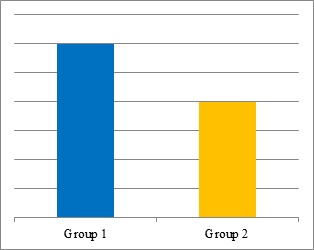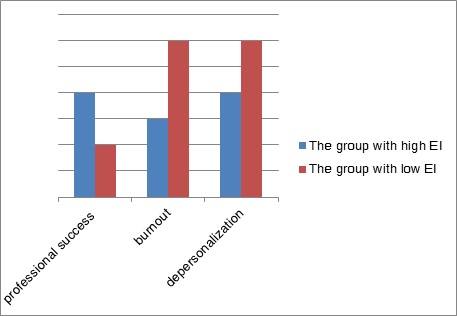Abstract
The urgency of the problem under investigation is due to the fact that emotional burnout is a manifestation of the destructive trends in professional activities and affects the solving of professional problems. Currently, teachers, psychologists, physicians actively study emotional burnout among representatives of socio-economic professions. Professional work of teachers in various studies should be given special attention. This article deals with the problem of uncovering the factors which facilitate the prevention of burnout syndrome of a person in educational activity. It is aimed at detecting the components of emotional intelligence which contribute towards prevention of burnout syndrome. Empirical study was conducted on a representative sample of teachers of secondary schools. The study results were justified methodologically and theoretically. The leading method to the problem of burnout is the method of empirical research that compares the psychological characteristics of teachers with different levels of severity of burnout and identify the factors that contribute to its prevention. There is a necessity in the studying of the psychological factors of burnout in professional work of teachers. The components of emotional intelligence that help to prevent the development of burnout were empirically examined. The results can be used by social psychologists, school psychologists and educational psychologists for the prevention and correction of emotional burnout of teachers.
Keywords: Burnoutemotional intelligenceperson in an activitymoralityethicalitypedagogical activity
Introduction
First and foremost, the person in pedagogical activity is a carrier of universal human values and knowledge, a person of great morality. Individual psychological constitution and professionally important qualities of a teacher should be taken into consideration in the process of educational activity. Moral and ethical characteristics of a teacher should meet strict requirements since they serve to conduct pedagogical influence on students. Educational activity consists of manifestations of affection, concern and love towards the students. Nothing has as great a negative influence on education as formality and insensibility towards them (Shushlyapin & Bogdan, 2010).
Educational activity is full of abnormal situations which correlate with the burnout syndrome. Such situations cause nervous strain in a teacher, which manifests itself in aggression and self-aggression (Simonova, 2012). Educators note that experiencing nervous strain leads to a decrease of working efficiency and mood, which is a symptom of burnout (Andreeva, 2008).
Today there is no consensus regarding the causes of syndrome of emotional burnout, factors and determinants of development. Traditionally, we considered the following groups of factors leading to this condition: individual, social factors concerning the nature of work and work environment (Kondo, 1991), personal, role, and organizational factors (Formanyuk, 1994), complementary outer and inner determinants, or personal and organizational, subjective and objective, as well as the factors arising from professional activities or incorrect organization (Maslach, 1982; Burke et al., 1988) or personal preferences as a factor.
It is obvious that the risk of emotional burnout significantly is increased by the factors affecting the employee from outside and not depending on himself and his behavior:
– peculiarities of professional activity: this includes monotonous or, on the contrary, the intense variability of the subject of labor and professional activities, emotional and communicative richness of the work, psychologically difficult clients, lack of professional competence, hard tangible result of work;
– organizational characteristics of the team: poor leadership style, destabilizing the organization of activity, adverse psychological climate in the team, lack of adequate assessment of the achievements (moral and material) and social support from administration and colleagues, the lack of prospects for professional growth (Formanyuk, 1994).
However, it should be noted that in equal conditions, some employees are prone to emotional burnout, which happens quickly and is irreversible, leading to change of profession. For others, the onset of this condition can be greatly prolonged in time and can decisively influence the quality of professional work, and for the third – it is in principle not common and its symptoms are virtually absent. Therefore, we can assume that it is dominated in similar personal characteristics of employees.
Significant professional characteristics of teachers stem from the kind of activity and perform professional duties.
Features of teachers’ activities often are distinguished by the nature of stress, what causes the appearance of a number of emotional disorders.
Disturbances in the emotional-volitional sphere often occur in teachers, which means the "coarsening" of the senses, the development of callousness, conflicts, irritability. There may seem like experience prolonged depressions, unexplained anxiety, loss of the ability to control emotional spheres, as well as the loss of the ability to adequate self-assessment, which may be accompanied by increased desire to ensure their own prestige and power over other people.
The specificity of the educational activities, the complexity of its modalities, psycho-emotional overload contribute to a relatively rapid development of professional deformation of the personality of the teacher. Undoubtedly, the intrapersonal changes, that are happening with such experts, reflect on their behavior, communication style, preferences, and generally in their work and personal relationships.
Taking the aforementioned data into account, we can come to the conclusion that success of educational activity depends on the aptitude to build positive relationships with people, as well as on capability to discern and understand people’s emotions. The main aim of the person in pedagogical activity is the development of capability to direct students towards achieving life goals they find important by means of moral upbringing. Ability to direct students towards achieving their goals is attained with the help of well-developed emotional intelligence of teachers. Consequently, a teacher with under-developed emotional intelligence suffers considerable professional losses, which affect the mental atmosphere of the lesson and their emotional state, and eventually leads to the development of burnout syndrome (Alexandrova, 2011).
Emotional intelligence is a key criterion of career advancement and success of the person in pedagogical activity, which signifies a teacher’s compliance with conditions of professional activity. This fact dictates the need to determine the components of emotional intelligence which favors prevention of burnout syndrome.
Problem Statement
The problem of prevention of burnout syndrome is of vital importance for the educational community. It is because educational activity requires constant emotional involvement in the process of education from a teacher, as well as in communication with parents and administration of educational institutions. The person in pedagogical activity bears responsibility for the result of their work, both on societal and moral level, which demands great emotional commitment. It causes the development of professional alienation which leads to negative mental conditions, which in turn contribute to the formation of neurotic disorders of people in pedagogical activities. The aforementioned factors contribute to burnout of the teachers and lead to the development of a negative perception of working process, which consequently affects success in fulfillment of one’s functions. Owing to this, there arises a need to solve
Research Questions
Maturity of emotional intelligence aids in decreasing the level of burnout of persons in pedagogical activity.
Purpose of the Study
The purpose of work is to determine the components of emotional intelligence, which contribute to the prevention of burnout syndrome of the subject of educational activity.
Research Methods
Results of the study are based on a solid methodological and theoretical foundation which indicates their validity. Statistical analysis were realized with the help of computer technologies. In conducting this scientific research, the following research methods were used: theoretical and empirical analyses, testing.
Empirical study was conducted on a representative selection of teachers who work at Kazan institutions of secondary education.
Findings
In order to ascertain how emotional intelligence aids in preventing burnout of the subjects of educational activities, we used Student t-test to divide the respondents into two groups based on the manifestation of the “Integrative level of emotional intelligence” (I-EI) (р≤0,01). The first group included teachers with the high level of I-EI, the second group – those with the low level of I-EI (figure

Based on the results of statistical analysis conducted with the aid of evaluation of the significance of differences according to Student's

Correlation analysis conducted on the whole group of correspondents allowed us to determine the following correlations (table
1. “Modulation of emotions” has a reverse correlative relationship with such components as “burnout” (р≤0,05) and “depersonalization” (р≤0,01) which allows us to conclude that a person’s ability to control and evaluate their emotional state leads to the decrease of passivity towards their activity and the increase of inner forces which give enough energy for communication with students and colleagues;
2. “emotional awareness” has a reverse correlative relationship with “burnout” (р≤0,001), which signifies that a better understanding of a person’s own emotions and emotions of others, leads to the decrease of the feeling of voidness, as well as of negative emotions in the process of educational activity;
3. I-EI has a reverse correlative relationship with such exponents as “depersonalization” (р≤0,001) and “burnout” (р≤0,001).
Conclusion
Emotional-ethical intelligence is a manifestation of emotional intelligence in terms of compliance with the teacher of ethics in solving his professional problems.
The study of emotional intelligence allows to identify the factors contributing to the reduction of emotional burnout of teachers. Selected methods and techniques of research designed to assess the level of burnout and its correlation with emotional-ethical intelligence.
Based on empirical investigation, we may conclude that understanding and recognizing your own and other people’s emotions, direct a teacher towards correct interpretation of various pedagogical situations. It allows them to manage their emotions in typical and, more importantly, atypical pedagogical situations, which facilitates understanding of an opponent. Development of emotional intelligence in the subject of educational activity decreases energy invested into the interpretation of causes of negative emotional state (such as resentfulness, grievance, frustrations et cetera) and aids in prevention of burnout, which verifies our hypothesis.
Acknowledgments
The work is performed according to the Russian Government Program of Competitive Growth of Kazan Federal University.
References
- Andreeva, I.N. (2008). On the Formation of the Term “Emotional Intelligence”. Issues of Psychology, 5, 83-95.
- Burke, R.J., Cooper C. L. & Payne R. (1988). Sources of managerial stress and professional stress in large organizations. Causes, coping and consequences of stress at work. Chichester: Wiley, 77-114.
- Formanyuk, T.V. (1994). Syndrome of "emotional combustion" as indicator of professional disadaptation of the teacher. Questions of psychology, 6, 57-64.
- Kondo, K. (1991). Burnout syndrome. Asian Medical J., 34(11).
- Maslach, C. (1982). Burnout: The Cost of Caring. The Cost of Caring. Englewood Cliffs. Prentice-Hall.
- Shushlyapin, O.I. & Bogdan, V.V. (2010) Consciousness, Emotional, Rational Intelligence and Faith in Their Interrelation and Interconditionality. Consciousness and Physical Reality, 15-6, 2-12.
- Simonova, L.B. (2012). Emotional Intelligence as a Chief Factor of Productivity of Educational Activity. Facets of Knowledge, 2-16.
- Winnubst, J.A.M., Buunk, B. & Marcelissen, G.H. (1988). Social support and stress: Perspectives and processes In: Fisher, S and Reason J . (Eds) Handbook of Life stress, Cognition and Health. New York : Wiley. Universitas Sumatera Utara.
Copyright information

This work is licensed under a Creative Commons Attribution-NonCommercial-NoDerivatives 4.0 International License.
About this article
Publication Date
31 August 2017
Article Doi
eBook ISBN
978-1-80296-028-0
Publisher
Future Academy
Volume
29
Print ISBN (optional)
-
Edition Number
1st Edition
Pages
1-960
Subjects
Teacher, teacher training, teaching skills, teaching techniques
Cite this article as:
Puchkova, I., & Khakimzyanov, R. (2017). Emotional And Ethical Intelligence Development To Prevent Burnout Syndrome In Pedagogical Activity. In R. Valeeva (Ed.), Teacher Education - IFTE 2017, vol 29. European Proceedings of Social and Behavioural Sciences (pp. 673-678). Future Academy. https://doi.org/10.15405/epsbs.2017.08.02.77

